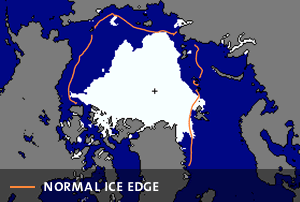Summer sea ice on the Arctic Ocean has shrunk to its second-lowest recorded extent, covering an area that is 33 percent smaller than the average minimum extent from 1979 to 2000. The record low extent was set last year, but cooler temperatures this summer led to Arctic sea ice coverage being nine percent greater than in 2007. Still, the National Snow and Ice Data Center (NSIDC) in Colorado said this year’s extremely low level shows a strong negative trend in Arctic sea ice. Indeed, this summer, for the first time in recorded history, both the Northwest Passage across Canada and the Northeast Passage above Russia were ice-free. This year also saw a further disappearance of the thicker, multi-year sea ice that has existed in the Arctic for millennia. The NSIDC said that compared to last year, this year saw less ice loss in the central Arctic, north of the Chukchi and North Siberian seas, and greater ice loss in the Beaufort, Laptev, and Greenland seas.
Arctic Sea Ice Shrinks To Second-Lowest Recorded Extent
More From E360
-
WILDLIFE
A Troubling Rise in the Grisly Trade of a Spectacular African Bird
-
MINING
In Myanmar, Illicit Rare Earth Mining Is Taking a Heavy Toll
-
INTERVIEW
How Batteries, Not Natural Gas, Can Power the Data Center Boom
-
ANALYSIS
As U.S. and E.U. Retreat on Climate, China Takes the Leadership Role
-
Solutions
From Ruins to Reuse: How Ukrainians Are Repurposing War Waste
-
ANALYSIS
Carbon Offsets Are Failing. Can a New Plan Save the Rainforests?
-
Energy
Facing a Hostile Administration, U.S. Offshore Wind Is in Retreat
-
Biodiversity
As Jaguars Recover, Will the Border Wall Block Their U.S. Return?
-
WATER
An E.U. Plan to Slash Micropollutants in Wastewater Is Under Attack
-
INTERVIEW
This Data Scientist Sees Progress in the Climate Change Fight
-
Climate
As Floods Worsen, Pakistan Is the Epicenter of Climate Change
-
Climate
Heat Stress Is a Major Driver of India’s Kidney Disease Epidemic
